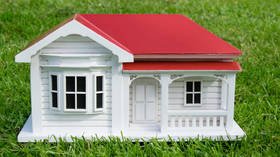Will you still love me to borrow? Steep rise in house prices forces New Zealanders to seek mortgage mates via dating apps

The mounting housing crisis in New Zealand is reportedly making young Kiwis appeal to Tinder and other dating apps in search of a partner who could assist in buying property.
The number of users looking for a union of this kind had more than doubled, surging 2.6 times year-on-year from June 2020 through June 2021, The Guardian reports, citing data provided by Tinder to news site Stuff.
The app users are reportedly saying in their profiles that they are searching for a person to combine incomes to enable purchasing of a house using the KiwiBuild couples limit.
Also on rt.com US home prices soaring amid low number of listings & robust demandSince the dating service refused to provide the precise data, the latest data points shouldn’t be taken very seriously. However, the revealed information is in line with the other findings, which suggests that partnering up is an effective solution for younger New Zealanders who are currently locked out of the market.
To buy a KiwiBuild home a New Zealand citizen, permanent or usual resident, must earn less than the relevant annual income caps, set at $120,000 for singles and $180,000 for couples.
According to the latest Consumer NZ's survey data, housing has been the number one concern for New Zealanders, ranking far above such issues as crime, food prices or the coronavirus pandemic.
The average house price has seen a year-on-year surge of 22% and totaled NZ$906,532 (US$644,195), according to the data tracked by US financial service firm CoreLogic. The country’s lenders commonly require a 20% deposit, that would mean a homebuyer laying out NZ$181,306 (nearly US$130,000), which is reportedly 3.2 times more than New Zealand’s average annual wage.
Also on rt.com New Zealand’s human rights body blasts ‘serial’ government failure & launches inquiry into housing crisis and homelessness problemThe rapid growth of housing prices force those come close to having a deposit to quickly slip out of reach. Would-be house buyers looking to muster a 20% deposit in 2021 would, on average, need NZ$33,662 (some US$24,000) more this year than they did last.
According to Consumer NZ’s data, 20% of New Zealanders said they were saving for a deposit but couldn’t catch up, and 42% said they were locked out completely – a total of 62%.
Homeownership rates in the country have been plummeting since 1991 and recently dropped to a 70-year low, with the reported fall occurring across all age groups. However, it is especially pronounced for people aged between 20 and 30.
For more stories on economy & finance visit RT's business section














